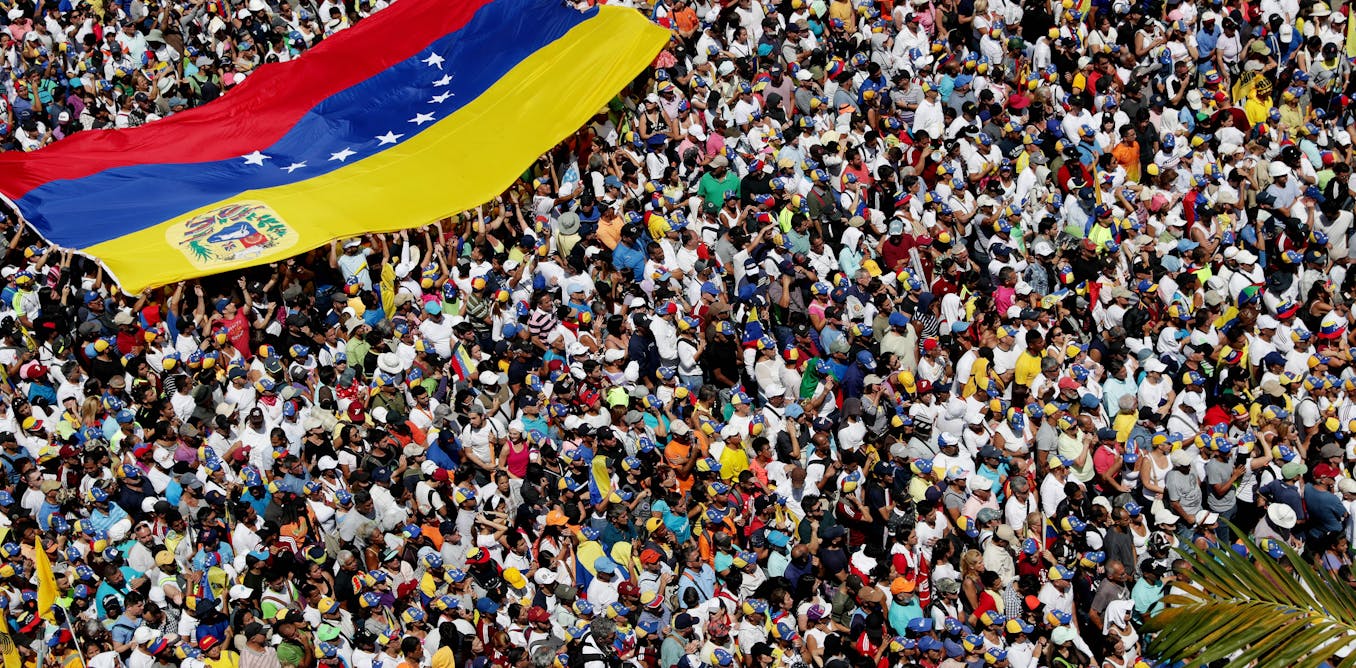
There appear to be two distinct responses to the current crisis in Venezuela. Either an authoritarian regime (led by Nicolás Maduro) is clinging to power against the wishes of popular forces arrayed around the new self-declared interim President Juan Guaidó. Or Venezuela is facing a coup backed by US imperialism with clear designs on the country’s huge oil reserves.
As with most complex situations, neither of these narratives fully captures what is going on. Indeed, for the majority of Venezuelans – thousands of whom have again taken to the streets across the country in peaceful demonstrations – ideological epithets pale in comparison to the economic impact they are experiencing in their daily lives.
Many face hunger, seeing family members flee the country (upwards of 3m have left the country) and rampant hyperinflation (predicted by the International Monetary Fund to reach an astronomical 10,000,000% in 2019).
And make no mistake – despite the much publicised US sanctions, the economic crisis in Venezuela is home grown. The government’s attempt to set prices for basic goods, maintain currency and exchange controls and regulate profits has decimated domestic production.
It has also strengthened black markets and encouraged the smuggling of everything from meat to nappies over the border with Colombia – a trade which has became an everyday survival strategy for thousands of Venezuelans.
Maduro’s government has been peddling the line of an “economic war” for over four years. It even denies inflation actually exists, while printing more money to pay for increases in a minimum wage that doesn’t even cover the cost of a dozen eggs.
In a recent television interview, Maduro blamed the supposed economic war when asked about a rate of 3% inflation per day in 2018. He also also expressed a willingness to hold talks with his political rival Guaidó – while also somewhat ominously stating that 50,000 civilian militia members with access to weapons were on stand by to “defend the peace”.
Sanctions that have been in place since 2017 have exacerbated the economic crisis, but were not successful in an attempt to force Maduro out of power. Yet, paradoxically, the very public US backing of Guaidó has increased the plausibility of Maduro’s claim – because with added sanctions now in place designed to restrict food supplies and oil equipment, that economic war has become very real.
The fact that this is a home grown crisis it not lost on the people taking to the streets. So it can seem surprising that some angry Venezuelans don’t welcome internationally supported regime change. Still others maintain steadfast supporters of “Chavismo” – the political movement named after the late president Hugo Chávez, Maduro’s predecessor. “Chavismo” still carries significant weight among activists anxious to defend “la patria” (the fatherland) from any external intervention.
Let’s take one salient example. The agricultural commune “El Maizal”, located between the states of Lara and Portuguesa, is perhaps the most successful worker run cooperative still struggling for their vision of 21st-century socialism. While extremely critical of the “corruption, bureaucracy and clientelism” that pervades the government, the commune’s Twitter feed expresses the militant sentiment of a people prepared to rise up against the perceived threat of “Yankee imperialism”.
With memories of the failed US backed attempt to oust Chávez in 2002, suggestions of an externally backed coup in 2019 have clear traction. This is given further credence by the fact that the White House allegedly knew Guaidó was going to declare himself interim president on January 23 – a move which took other Venezuelan politicians by surprise, and in a country where a reported 81% of the population had never heard of the young politician.
Money matters
Domestically, for the moment, the Venezuelan military appears to be holding the trump card, with just one high ranking military official so far rebelling against Maduro. But the geopolitical fault lines are also significant.
China and Russia, owed billions for pre-paid oil deliveries and other loans, have backed Maduro, along with Cuba and Turkey. The majority of Latin American countries (except Mexico, Uruguay and Bolivia) and the EU (except Italy) have followed the US in recognising Guaidó, and called for new elections.
As the crisis continues, financial pressures have been ramped up. The UK is refusing to release US$1.2 billion of Venezuela’s gold reserves and the US has deepened sanctions, and seized assets in an attempt to divert funds to Guaidó’s nascent parallel government.
That the legal foundations of Guaidó’s claim – including his own “democratic” credentials – are tenuous at best should not cloud us from the mass mobilisations calling for Maduro to go.
A negotiated transition that brings all sides to the table for future elections has been suggested as the only way out of this polarised stand off. This option would appear to be favoured by large numbers of Venezuelans who appear unimpressed by either of the men setting themselves up to lead, proclaiming to be with neither one nor the other: “Ni con uno ni con otro!”.![]()
Thomas Purcell, Senior Lecturer in International Political Economy, Leeds Beckett University
This article is republished from The Conversation under a Creative Commons license.


